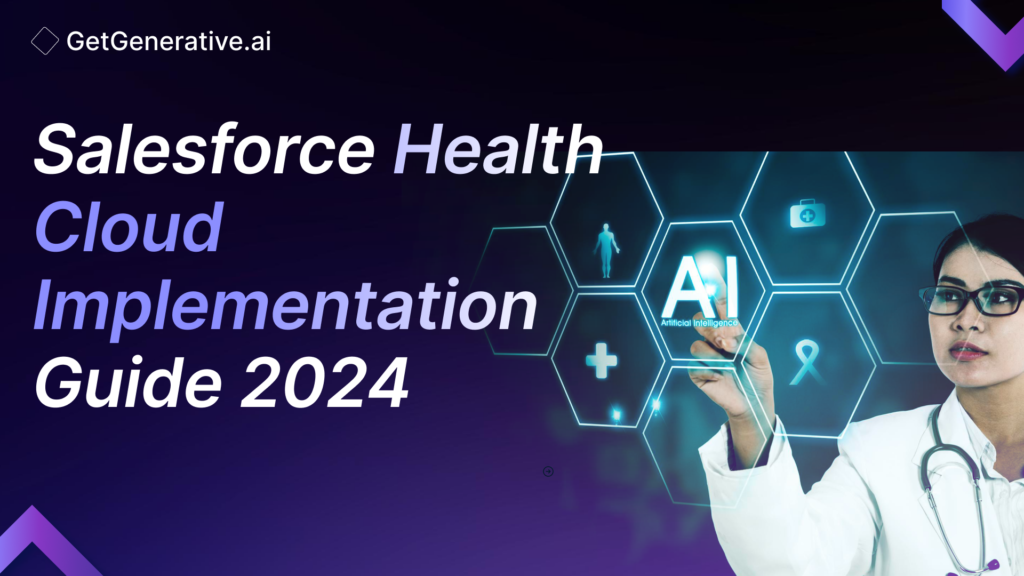Salesforce Health Cloud Implementation Guide 2024
In an age where health care is significantly intertwined with technology, organizations are constantly seeking answers to improve their operations and for the good of patients. Amongst such countless opportunities, Salesforce Health Cloud stands out as the biggest game in town, providing a robust platform that harnesses the force of cloud computing to revolutionize healthcare management.
Markets and Markets forecasts that the global healthcare cloud computing market is expected to grow from $53.8 billion in 2024 to $120.6 billion by 2029, representing a compound annual growth rate of 17.5%. This trend is due to the adopting of cloud-based solutions across the healthcare industry to increase storage space and compute power and make it cost-effective.
The Salesforce Health Cloud is leading this change, offering integrated services to improve the care delivery process. This blog delves into the specifics of implementing the Salesforce Health Cloud, looking at its benefits and features and comparing them with healthcare regulations.
What is Salesforce Health Cloud?
Salesforce Health Cloud is a healthcare and life sciences-specific solution developed by Salesforce. It is made for healthcare and life sciences organizations based on the Salesforce Customer Success Platform, integrating services for health professionals to manage relationships with patients more effectively.
The platform combines features of EHRs with business intelligence in a single interface. The interface is more harmonious, better at communicating with each other, and achieves workflows on the part of caregivers and patients.
Salesforce Health Cloud Features
With this feature and capability, Salesforce Health Cloud comes with expansive functionality combined with specific tools, which have been designed to help address the ever-diverse needs of healthcare systems in detail and has come to be described almost as a “Swiss Army Knife” for virtually every difficulty that accompanies medical care and patient management:
- Patient Management: This core feature enables healthcare providers to create comprehensive patient profiles that include detailed medical history, ongoing treatment plans, lifestyle factors, and personalized care preferences. This holistic view helps clinicians deliver customized care tailored to individual patient needs.
- Health Timeline: This visual representation of a patient’s health journey is crucial for clinicians. It chronologically details every interaction, medication, test result, and significant health event. This timeline provides a quick, historical overview invaluable for new doctors, specialists, or emergency care providers who must understand the patient’s background swiftly and thoroughly.
- Care Team Coordination: It would enhance better coordination between the care team by providing access and the opportunity to update the care plans and schedules and communicate a patient’s needs in real-time; that way, it reduces the possibilities of errors, bringing everyone on the same page.
- Interoperability Interface: Health Cloud will enable EHRs and other health applications already running in most healthcare provider centers through its in-built capabilities. Thus, it is obvious that data flow across the systems will not depend on human interfaces and may have little or no dependence to avoid data inconsistency and ensure real-time updates.
- Einstein Analytics: Directly built into Health Cloud. It uses AI to analyze vast amounts of health data, thereby determining trends, predicting outcomes, and recommending preventive measures. All this might translate into possible early interventions and better management of patients with chronic diseases.
- Secure Messaging: This is the feature where secure communication can be made to the patients by the care team. Whether scheduling appointment reminders, sending health information reminders, or even some kind of care plans, the messages ensure full compliance with health privacy laws.
- Patient Engagement Tools: Personalized and automated patient engagement tools offered by Health Cloud allow providers to push customised health education content, wellness tips, as well as post-care instructions directly to patients mobile devices or to their email. This would mean a continuous connection that helps maintain it even when there are no visits, empowers patients, and increases compliance with care plans.
Salesforce Health Cloud features are designed with a focus on workflow simplification, quality improvement of care, and patient-centered care in healthcare organizations. All these result in providers’ efficiency and effectiveness while working with better operational efficiency to enhance the outcomes of their patients.
Related Read – Salesforce Implementation With AI Guide
Benefits of Salesforce Health Cloud
Implementing Salesforce Health Cloud brings numerous benefits to healthcare organizations, including:
- Engagement of Enhanced Patient: The providers of care would give individual care compared to 360-degree views of the patients through enhanced comprehensive patient profiles.
- Improved Collaboration: Health Cloud also supports great collaboration between the healthcare professionals as they receive real-time access to health critical data for insightful decisions.
- Efficient Operations: It goes a long way toward efficient operations by reducing the number of errors produced by manpower on paperwork and granting the medical staff more time to care for patients rather than paperwork.
- Data-Driven Insights: The analytics capabilities make it possible for the healthcare providers to extract insights from patients’ data, thus enabling them to make healthier life choices and proactively manage their health.
How to Integrate Salesforce Health Cloud?
Integrating Salesforce Health Cloud into your healthcare organization involves several detailed and strategic steps to ensure a smooth transition and maximum utilization of the platform:
Assessment and Planning:
Before any technical steps are taken, a thorough assessment of the current IT infrastructure and healthcare processes is crucial. This involves identifying the organization’s specific needs, the challenges to address, and the goals for the Health Cloud implementation. Key stakeholders, including IT specialists, healthcare providers, and management, should be involved in creating a comprehensive implementation roadmap that outlines timelines, resource allocation, and expected outcomes.
Data Migration and Integration:
One of the most critical steps is migrating existing patient data into the Salesforce Health Cloud. This process must be handled carefully to maintain data integrity and security. It involves:
- Data Cleansing: Ensuring that only accurate, complete, and necessary data is transferred. This might require cleaning up redundant or outdated information.
- Data Mapping: Aligning existing data formats to the new Salesforce Health Cloud structure. This is crucial for maintaining data consistency and ensuring seamless integration.
- Testing: Before full migration, a pilot test is essential to ensure data flows correctly into the new system and integrates well with existing systems such as EHRs and other practice management software.
Also Read – Salesforce B2B Commerce Implementation Guide
Customization and Configuration:
Salesforce Health Cloud permits highly customized transactions that align with the organization’s specific workflows and patient management processes. This can include:
- Custom Fields and Objects: Establish fields and objects based on specific healthcare services or specialties.
- Workflow Automation: Standardize regular workflow processes like following up with patients, appointment scheduling, and reminders on medication to make it more productive and free of human errors.
- User Interface Customization: Design the user interface so that every user, from the administrative staff to the healthcare providers, can use it intuitively and effortlessly.
System Integration:
It is also one of the most crucial integrations for a 360-degree IT environment; Salesforce Health Cloud needs to work seamlessly with other systems. For example,
- API Integration: API-based real-time data exchange between Salesforce Health Cloud and critical systems in an organization such as EHRs, billing software, and Lab Information System.
- Single Sign-On (SSO): Deploying SSO to ensure easy access to all systems while enhancing security.
Training and Adoption:
Adoption of new technology is highly dependent on its adoption. Thus, the provision of a detailed and multi-level training session that addresses the requirement of different user groups within an organization is quite necessary. These may include:
- Role-Based Training: Curriculum crafted individually for each employee’s role and responsibility.
- Continuous Learning: creating sustaining channels for training and support to empower the user to gain adaptation towards system updates and new features.
Continuous Support and Maintenance:
Once it has gone live, continuous monitoring and maintenance are required to ensure that the system works smoothly and evolves continuously with organizational needs.
This includes:
- Technical Support: having a dedicated team for technical issues and quick solutions.
- System Upgrades: The system should be upgraded periodically to take advantage of the latest features and upgrades and to abide by the new rules related to health data.
With careful planning and implementation of every aspect, healthcare organizations are effectively able to execute Salesforce Health Cloud, which will be a valid, safe, and effective platform that aims to improve patient care and simplify healthcare operations.
Also Read – Salesforce CPQ Implementation Guide
How does Salesforce Health Cloud Handle Data Privacy?
The most significant concern in healthcare is data privacy. Salesforce Health Cloud is, therefore, equipped with a heavy protective layer of security regarding sensitive patient information. For instance, it uses some best-of-breed data encryption, verifies access through authentication of who’s trying to access an account, and maintains strict limits on access. On top of that, the platform can assist in the adoption of healthcare data protection regulations with all the various resources made available for managing consent and auditing data.
Is Salesforce Health Cloud Compliant with International Healthcare Regulations?
- HIPAA (Health Insurance Portability and Accountability Act) ensures the confidentiality and security of healthcare information.
- GDPR (General Data Protection Regulation) in Europe addresses data protection and privacy in the European Union and the European Economic Area.
- Other regional regulations depending on the geographical area of operation.
These levels of compliance assist healthcare organizations in maintaining standards and not breaching data and penalty non-compliance.
Conclusion
With the help of Salesforce Health Cloud implementation, healthcare organizations can transform themselves into more efficient units towards better patient care in the challenging scenario of modern healthcare. Healthcare providers can integrate this powerful tool with current technologies to make patient care practices more personalized, insightful, and secure.
To learn more, sign up with GetGenerative.ai today.
Frequently Asked Questions (FAQs)
1. What makes Salesforce Health Cloud different from other medical CRM systems?
Salesforce Health Cloud is specifically designed for healthcare, integrating deeply with clinical data and supporting compliance with healthcare regulations, which sets it apart from generic CRM systems.
2. Can Salesforce Health Cloud be integrated with any EHR system?
Yes, Salesforce Health Cloud can be integrated with various EHR systems through its interoperability capabilities, ensuring that patient data flows seamlessly between systems.
3. What is the typical implementation timeframe for Salesforce Health Cloud?
The implementation timeframe can vary based on the scale of the operation and specific needs but generally ranges from a few months to a year.
4. How is patient data secured in Salesforce Health Cloud?
Patient data is secured through encryption, both in transit and at rest, comprehensive access controls, and regular security audits.
5. Can Salesforce Health Cloud handle large volumes of patients?
Yes, It is built on the scalable Salesforce platform, which is capable of handling large volumes of data and patients efficiently.





